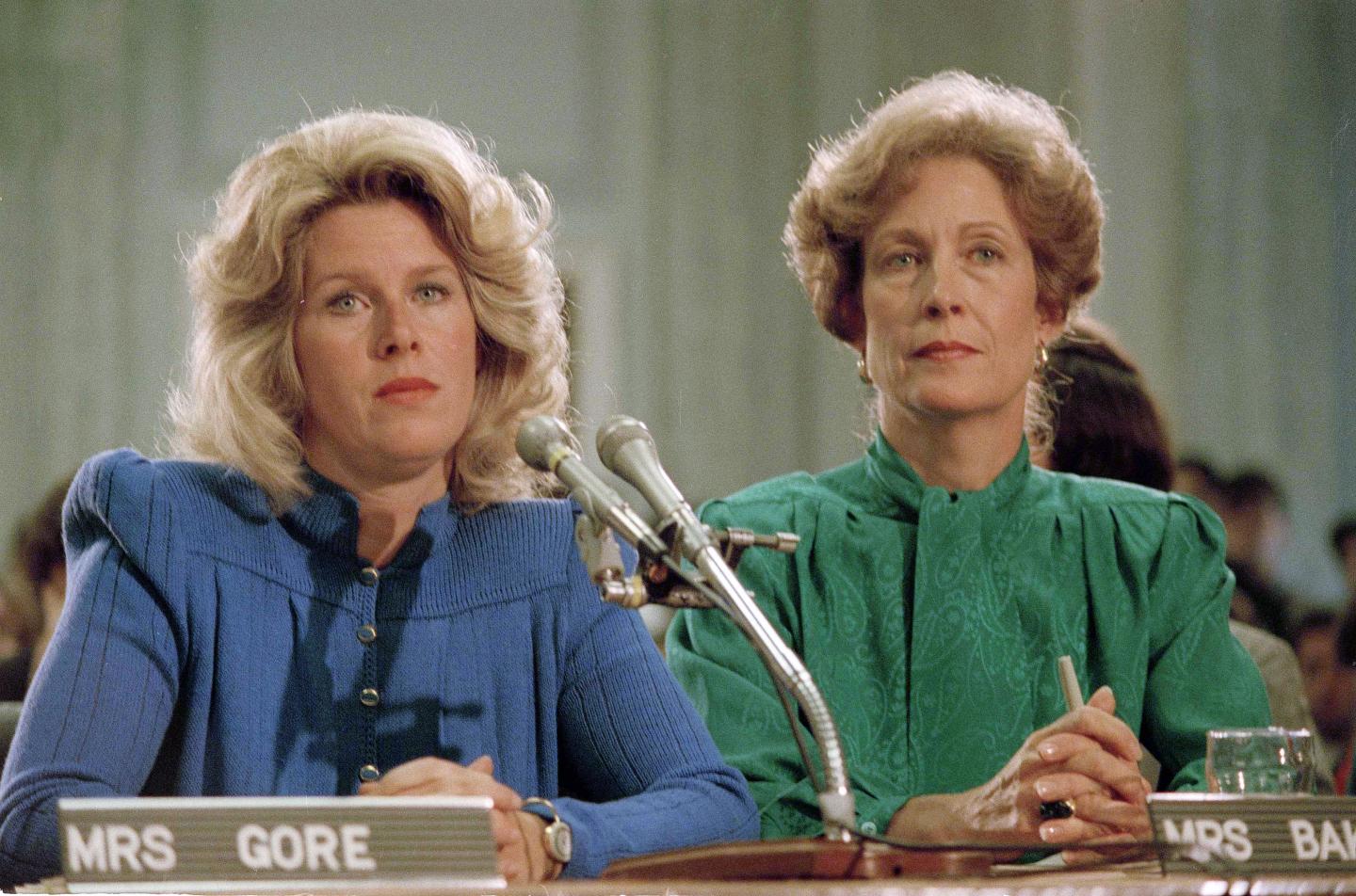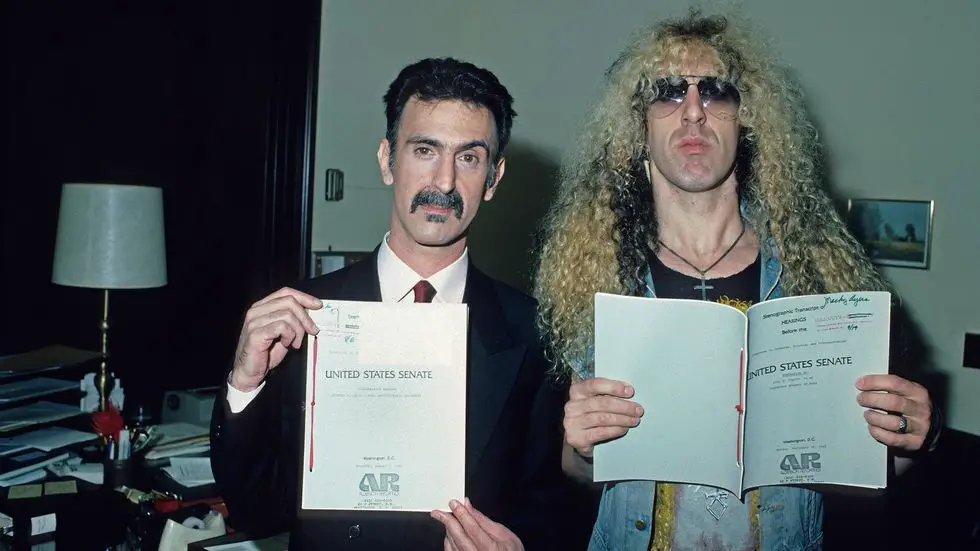What Was The PMRC?
The “Parents Music Resource Center” or PMRC was an American committee established by the “Washington Wives;” Tipper Gore, Susan Baker, Pam Howard, and Sally Nevius. Furthermore, they are all women whose husbands were connected to the capitol. Its purpose was to increase the role parents had in controlling the music their children listened to. In short, their solution included the establishment of “Parental Advisory” stickers placed on the packaging of sufficiently vulgar music. While its membership numbers peaked at 22 participants, the Parents Music Resource Center dismantled before 2000.
The Filthy 15 Songs
The Filthy 15 was the nickname given to the 15 current songs deemed most inappropriate by the PMRC.
- Darling Nikki from Prince’s “Purple Rain.” Reasoning: Sexual lyrics.
- Sugar Walls, a single by Sheena Easton. Reasoning: The title and lyrics alluded to the v****.
- Eat Me Alive, a track on Judas Priest’s “Defenders of the Faith.” Reasoning: Tipper Gore described the song’s lyrics as demanding oral sex at gunpoint.
- Strap On ‘Robbie Baby’, both a single by Vanity and part of her “Wild Animal” album. Reasoning: Sexually explicit lyrics.
- B***** from Mötley Crüe’s second album, “Shout at the Devil”. Reasoning: Excessive amounts of violence or adult language.
- Let Me Put My Love Into You from AC/DC’s “Back in Black.” Reasoning: Sexually evocative lyrics.
- We’re Not Gonna Take It from Twisted Sister’s “Stay Hungry.” Reasoning: Violent lyrics.
- Dress You Up from Madonna’s “Like a Virgin.” Reasoning: Sexuality.
- Animal (F*** Like a Beast) by W.A.S.P., a song that intended for their first album but released as a single. Reasoning: Adult language and sexuality extending beyond its title.
- High ‘n’ Dry (Saturday Night) from Def Leppard‘s multi-platinum album of the same title. Reasoning: The song’s allusions to rock stars enjoying drunkenness and drugs earned its “filthy” designation. It is one of two songs listed on the Filthy 15 noted for referencing drugs and alcohol.
- Into the Coven from “Melissa,” Mercyful Fate’s debut album. Reasoning: Mentioning the occult when the hysteria of “Satanic Panic” was in full swing.
- Trashed from Black Sabbath’s first album, “Born Again.” Reasoning: The same reasons as Def Leppard’s High ‘n’ Dry.
- In My House, from Mary Jane Girls’ album “Only For You.” Reasoning: Allusions to sex; the performers later clarified that the song was about tasteful love-making.
- Possessed, the eponymous sixth track from Venom’s fourth album. Reasoning: The same reasons as Melissa’s Into the Coven.
- She Bop from Cyndi Lauper’s debut album “She’s So Unusual.” Reasoning: Allusions to sexuality and masturbation.
The Senate Hearing

Tipper Gore (L) and Susan Baker (R) testifying in Washington D.C. on September 19, 1985 (LANA HARRIS/AP).
The Senate hearing began on September 19, 1985, and saw the PMRC, Dee Snider, Frank Zappa, John Denver, Senator Al Gore, and Senator Paula Hawkins testify before the Committee on Commerce, Science, and Transportation. The hearing’s overarching issue concerned the content of songs and the idea of labeling albums containing explicit content.
Senator Hawkins opened by presenting music videos and album covers to establish that music had greatly changed since Elvis’ days. Susan Baker stated song lyrics like the Fifteen must contain explicit lyrics warnings. Tipper Gore requested record labels to voluntarily label albums. Millie Waterman, Vice President for Legislative Activity of the National PTA, suggested treating explicit albums like films. Lastly, Dr. Joe Stuessy, a music professor for the University of Texas, cautioned that heavy metal was different enough from church music that it posed a moral hazard.
Zappa rebuffed the Committee and felt that its actions offer no tangible benefits to children, infringed upon adults’ rights and could lead to years of quagmires legalizing content morality. Snider took a similar stance as Zappa, defending his work and commenting that some people only hear what they wanted to hear. Snider finished by saying that he and his wife, rather than a sticker, would be the final arbiter for what his children listened to. On the other hand, Denver participated under a stance of unflinching anti-censorship.

Frank Zappa and Dee Snider after testifying at a Senate hearing on music censorship in September, 1985.
The RIAA Caves In
By November 1st, the RIAA decided that it would voluntarily require “Parental Advisory” stickers to be placed on appropriate albums, albeit without the specified content descriptors the Committee originally wanted and before the hearing had concluded.
The PMRC’s actions served as another instance of parents wanting outside forces to monitor their children’s content. While some stores refuse to sell “stickered” albums, several people, including John Denver, have mentioned how labeling encouraged others to search for uncensored versions of songs they may otherwise have had no interest in. While kids in rural areas may not be able to pick up the latest controversial album from nearby Wal-Mart, the internet is far less restrictive.